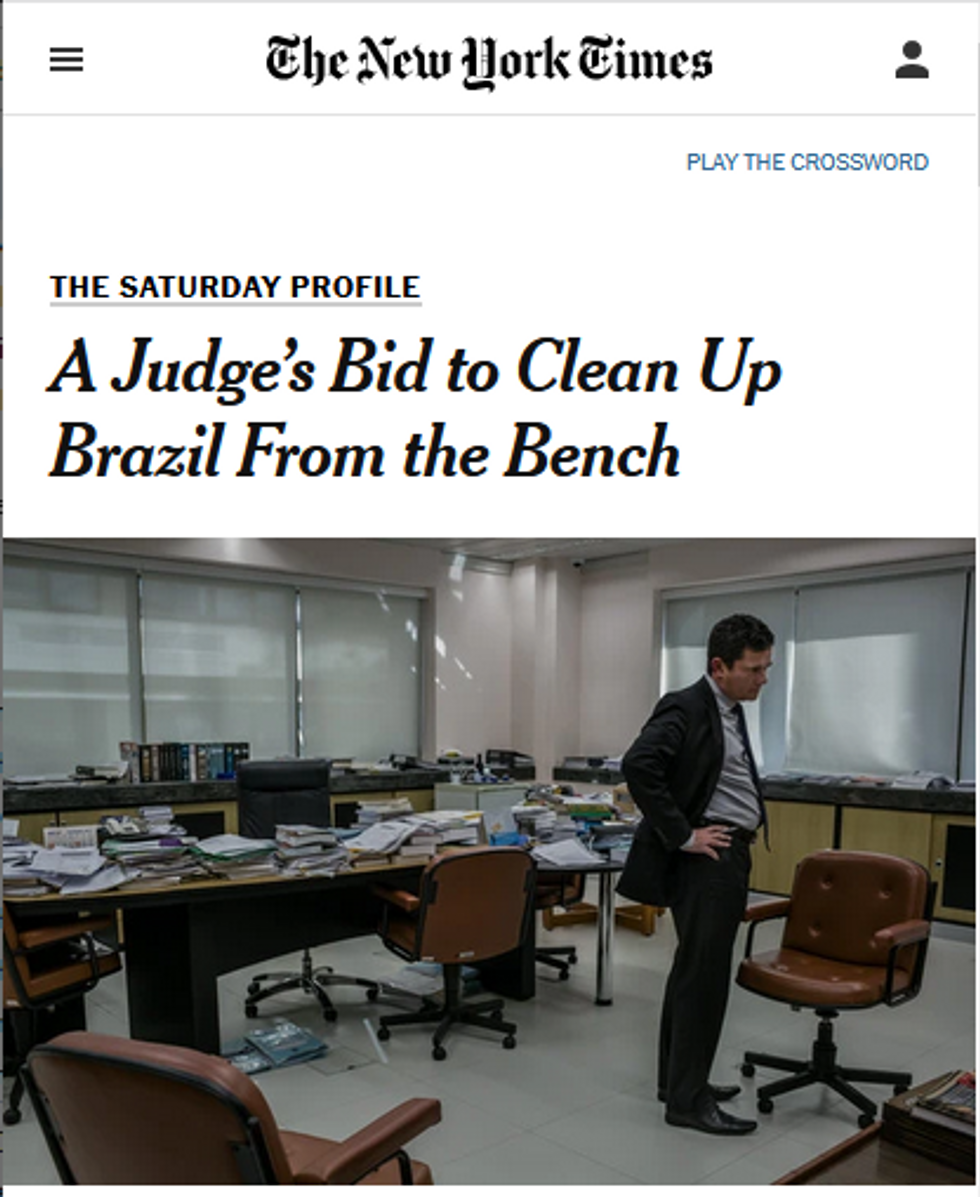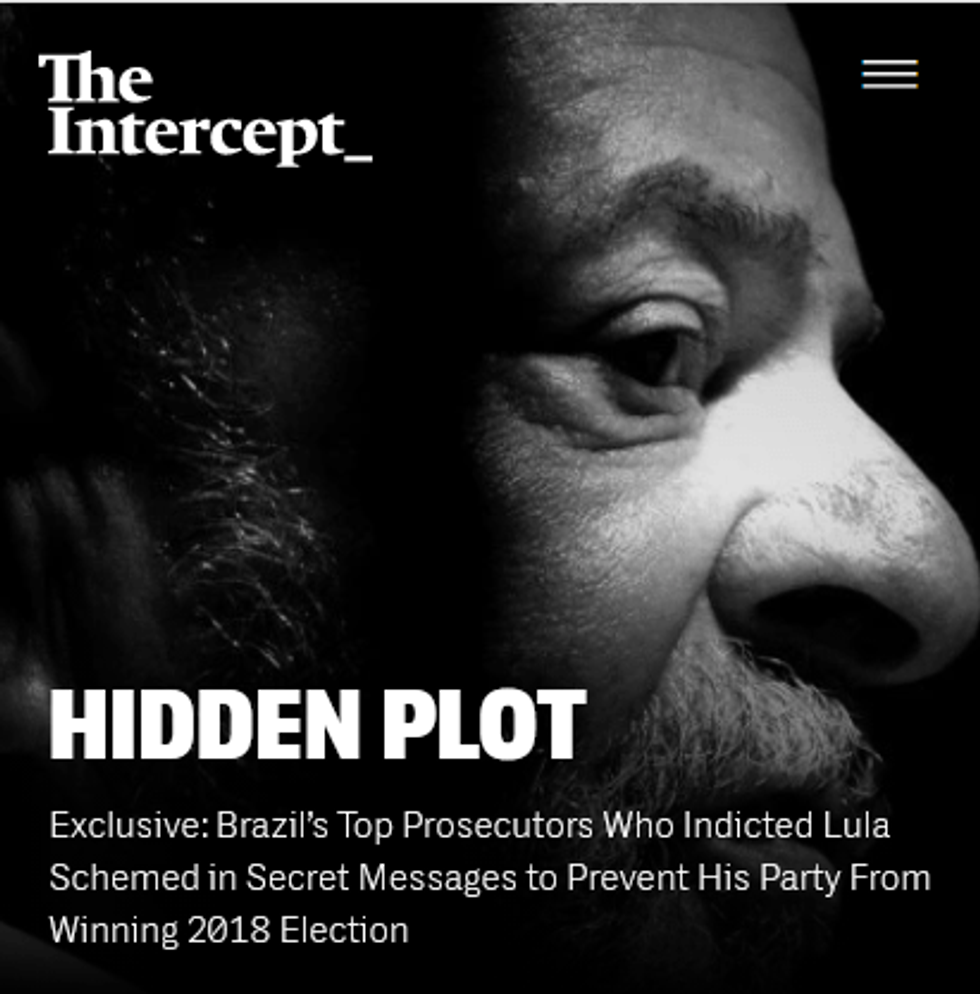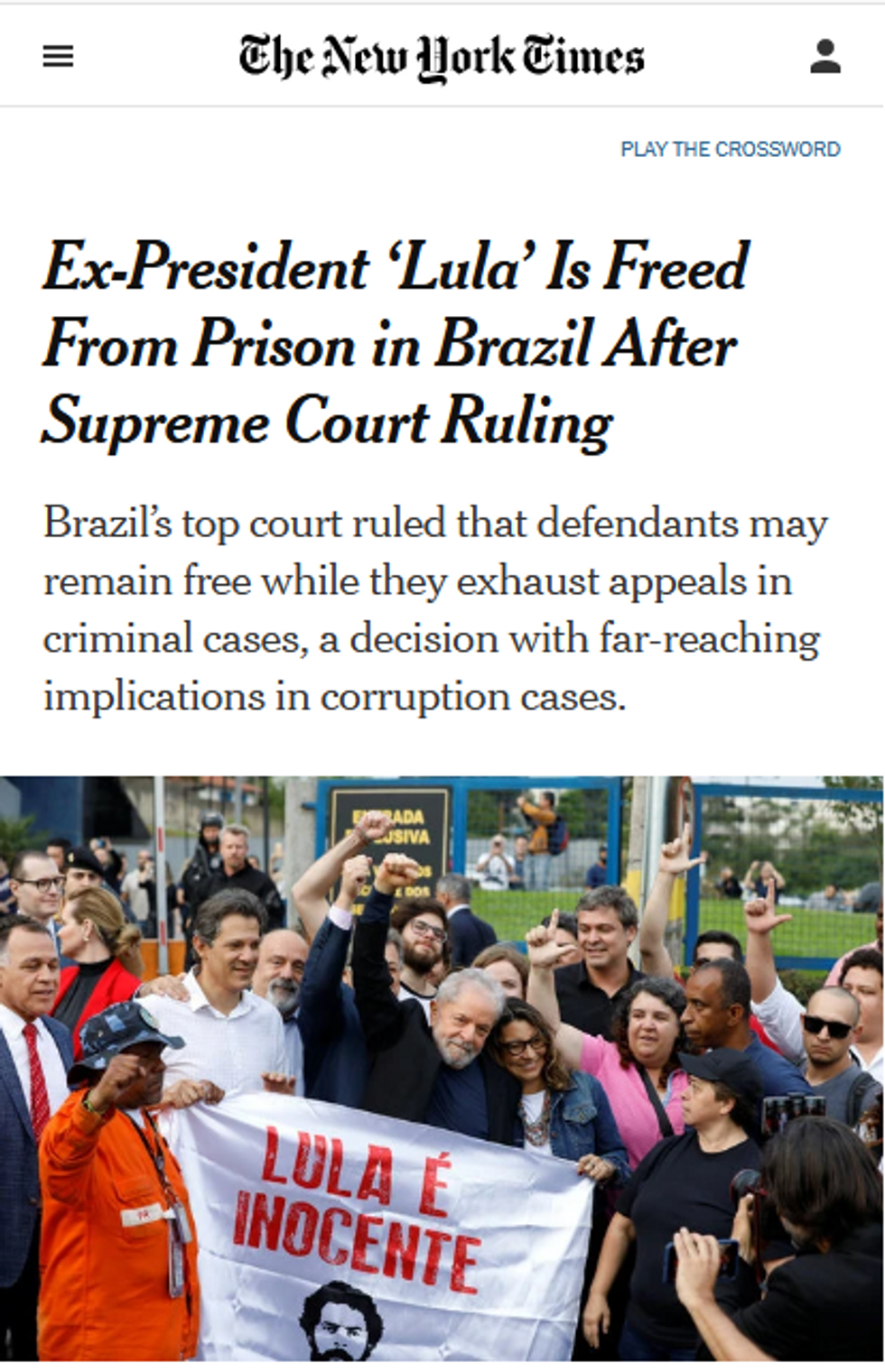The Brazilian Supreme Court reversed a 2018 ruling on November 7, upholding the principle of innocent until proven guilty in the 1988 Constitution and declaring it illegal to jail defendants before their appeals processes have been exhausted. Within 24 hours, former President Luiz Inacio Lula da Silva was released to an adoring crowd of hundreds of union members and social movement activists who had maintained a camp outside the police station where he was held, shouting "good morning," "good afternoon" and "good night" to him for 580 consecutive days
The Supreme Court had previously ruled, on April 5, 2018--after a threat from Brazilian Gen. Eduardo Villas Boas--that defendants could be preemptively jailed before their appeals processes played out. Directly afterwards, Judge Sergio Moro pressed for an immediate election-year arrest warrant for the PT party founder at a moment when he was widely leading in all polls. (The far-right candidate who won in the wake of Lula's removal from the race, Jair Bolsonaro, went on to name Moro his "Super Justice Minister.")
Lula's arrest came as part of a wide-ranging international investigation, ostensibly aimed at corruption, called Lava Jato ("Car Wash"), which involved the US Justice Department, US Security and Exchange Commission and Swiss federal police, working with Judge Moro and a public prosecutor team based in the conservative Brazilian city of Curitiba (CounterSpin, 6/21/19). The only charge that prosecutors had been able to stick on Lula was that he had committed "indeterminate acts of corruption."
At the time, the Anglo media ignored US involvement in the investigation, built Moro up as a superhero, and failed to provide any kind of critical analysis of the proceedings against Lula, despite complaints from some of the world's leading legal scholars and human rights activists that the former president was victim of a politically motivated kangaroo court proceeding designed to remove him from the presidential elections.
There was no material evidence linking Lula to any crime. His conviction was based on coerced plea bargain testimony by a single convicted criminal named Leo Pinheiro, director of the OAS construction company, which built the building where an apartment that featured in Lula's case was located. Sentenced to ten years and eight months for paying bribes to Petrobras Petroleum company, Pinheiro originally testified that Lula had not committed any crime, then changed his story twice, implicating Lula before having his sentence reduced to two years and six months. His third and final story stated that Lula had received free renovations on the beach-side apartment in exchange for political favors.
Seventy-three witnesses, including executives from the OAS company, testified that neither Lula nor anyone from his family had ever owned or lived in the apartment. Furthermore, a judge in Brasilia determined in January 2018, as part of a different case, that the vacant apartment still belonged to OAS. The prosecutors were unable to prove that the renovations had ever actually taken place. Although Sergio Moro had barred the press from visiting the site, the MTST housing movement broke in and filmed a video which proved that, contrary to prosecutors claims, the strikingly cheap-looking apartment had never had any of the renovations listed by the prosecutors, including installation of a private elevator and luxury appliances. The Lava Jato task force prosecutors and Judge Moro were unable to prove that they had any legal jurisdiction over a case involving an alleged crime in a different state, Sao Paulo, which has its own court system, after they dropped an initial frivolous charge alleging a connection between the apartment renovations and a money-laundering scheme involving the Petrobras petroleum company. Finally, the alleged renovations, which prosecutors were unable to prove ever took place, in an apartment that they were unable to prove belonged to Lula, supposedly happened three years after he left public office, meaning that it was legally impossible to prove abuse of authority
When Moro, who was declared a Time personality of the year in 2016 (4/21/16), declared Lula guilty of committing indeterminate acts of corruption, Western corporate media made little to no mention of prosecutorial misconduct, which was written about extensively in independent Brazilian media and legal publications. Moro had broken the law on multiple occasions in his zeal to put the former president behind bars. Using a legal loophole dating back to the Inquisition that enabled him to both oversee the investigation and rule on it, he ordered the Federal Police to wiretap Lula's defense lawyers. This enabled the prosecutors to map out all possible moves by the defense and plan their reactions in advance. Moro also illegally wiretapped President Dilma Rousseff, then illegally leaked out-of-context audio to Brazil's largest TV network on the eve of her impeachment hearings. In 2017, US Assistant Attorney General Kenneth Blanco bragged about informal communications with his friends in the Lava Jato task force, which violates Brazilian law by bypassing security protocols.
There was certainly enough information out there to suggest that Lula might be the victim of a political witch hunt to keep him from becoming president. This is, in fact, what the AFL-CIO, Noam Chomsky, Angela Davis, Bernie Sanders and 29 Members of Congress were all saying at the time. However, no shadow of a doubt was allowed to fall over the proceedings in Anglo media. In the New Yorker (7/13/17), Alex Cuadros gushed that Lula's conviction was "the most important criminal conviction in Brazil's history." And the week of Lula's arrest, the Guardian (4/3/18) erroneously claimed that his conviction was connected to an "R$88 million graft scheme" involving Petrobras that Judge Moro had specifically explained in his ruling was not the case.
Behind bars and (illegally) barred from speaking to the press, Lula continued to run for president. Three months after he was arrested, he still led all election polls, with double the support of his nearest competitor. Then the UN Human Rights Committee issued a ruling, legally binding according to both international and Brazilian law, stating that Lula had the right to run for president. But as in the April 5, 2018, Supreme Court ruling, the judiciary decided to make an exception to the law, specifically to bar Lula from the campaign. Less than one month before the elections, the PT party was forced to provide a replacement candidate.
All things considered, the electoral results were better than expected. The PT party remained the largest party in Congress and became the party with the most governors. Last minute candidate Fernando Haddad made it to the final round and received 47 million votes, but it was not enough
Months after Bolsonaro took office, the Intercept's Glenn Greenwald revealed thousands of hours of social media conversations between Lava Jato prosecutors and Moro. They showed the supposedly impartial judge giving instructions to the prosecutors, not only on how to improve the accusations, but on how to conduct a media strategy to commit character assassination against Lula. They exposed collusion with a Supreme Court Justice to issue a gag order preventing Lula from speaking to the press during the leadup to the 2018 presidential elections, in order to aid Bolsonaro's campaign. They showed Lava Jato prosecution task force leader Delton Dallagnol praying to God that Bolsonaro would win the presidential election. Most damning of all, perhaps, is the conversation conducted between Dallagnol and the other prosecutors, only a few hours before the final trial, revealing that they didn't think they had any proof, but that Moro was going to guarantee a conviction.
The US Department of Justice announced in March 2019 that it was going to give Dallagnol and his Lava Jato task force $682 million to open a privately managed "anti-corruption" foundation in Curitiba. The money would come from the $3.5 billion in fines that the DoJ and SEC collected in Lava Jato's process of bankrupting and dismantling Brazil's largest companies in the leadup to the 2016 legislative coup against President Rousseff.
The move was blocked by the Superior Justice Court, but it raised questions among some US lawmakers about how deep the US government's role went in Lava Jato. On August 21, Rep. Hank Johnson (D.-Georgia) and 12 other members of Congress delivered a letter to Attorney General William Barr demanding answers to a series of questions about possible legal and ethical violations committed by the DoJ during its partnership with Moro and Lava Jato. One of the questions reads, "Did DoJ provide assistance with the collection or analysis of evidence compiled by the Lava Jato Task Force and Judge Moro for President Lula's case?"
On September 25, Rep. Raul Grijalva and 14 other members of Congress introduced House Resolution 594, "expressing profound concern about threats to human rights, the rule of law, democracy and the environment in Brazil." Moro is repeatedly criticized in the text of the resolution, which mentions the Intercept leaks, and states that
Sergio Moro, the presiding judge in da Silva's case, acted in a clearly biased manner toward da Silva, violating his right to a fair and impartial judicial process under Brazilian law.
One might think that by now US corporate media would finally begin to question the narrative that Lula is somehow guilty of corruption. Wouldn't American readers be interested in learning about the role their Justice Department played in this process? Aren't the leaked social media chats published by the Intercept relevant to the story of Lula's release, especially since they were mentioned in the Brazilian Supreme Court ruling?
Unfortunately, since Lula's release, none of the major corporate media outlets have mentioned the US Department of Justice role in Lava Jato at all. Although a few papers mentioned the Intercept revelations, they are reframed and rendered less threatening to the narrative, presented in the context of "raising doubts among some" about the investigation.
On the day Lula was released, Bloomberg (11/8/19) ran an article which does not mention illegal collusion between judge and prosecutors. It states instead:
The ex-president was convicted of corruption in 2017 and lost two appeals since then, but he has not exhausted the entire process. He has repeatedly denied wrongdoing and has said he's victim of political persecution.
The Washington Post's first article (11/8/19) on Lula's release also failed to mention the corruption scandal which has enveloped Lava Jato, although it provided a link to a previous article (6/17/19) on that subject.
In two articles about Lula's release, the BBC (11/9/19) likewise ignored the illegal collusion between judge and prosecutors in Lava Jato.
On the day Lula was released, the Guardian, whose Latin America editor Tom Phillips wrote 22 articles normalizing Bolsonaro in October 2018 in the leadup to the elections, made the editorial decision to rerun an AP article that makes no mention of the leaked social media conversations. One day later, the Washington Post's Dom Phillips (11/8/19), who was one of the biggest cheerleaders for Lula's political imprisonment in the international media, briefly mentioned the Intercept revelations and Moro's ethical problems in the context of an article that misrepresented Lula's conviction as being connected to "money laundering," and ended with an uncritical treatment of other frivolous charges against the former president.
The New York Times (11/8/19) mentioned the leaked audio messages, saying that they "made clear, for instance, that Mr. Moro had actively advised prosecutors on strategy in the case, conduct that legal analysts have called an ethical and legal transgression," then quoted Moro on the case and stated that he disputes the idea that he acted improperly.
Despite the evidence of Lula's innocence and illegal persecution, with the cooperation of the US DoJ, that removed him from the 2018 presidential elections, establishment media cling to a false narrative that, while weakened by the subsequent actions of current "Super Justice Minister" Moro, still attempts to damage the public image of the most popular president in Brazilian history.
As the smear campaign continues, it is important to remember that Lula represented a social democratic national development project, in the tradition of what Brazilians call desenvolvimentalismo, based on strategic control over natural resources and their use to fund public services like health and education, strong minimum wage policies and labor rights, increased access to free public universities, and strong investment in scientific research. This is the project that was dismantled after the 2016 coup, to the benefit of corporations like Monsanto, Chevron, ExxonMobil and Boeing. History shows that every Brazilian president who ever tried to implement desenvolvimentalista policies--from Getulio Vargas, Juscelino Kubitschek and Jango Goulart to Rousseff and Lula--has been subjected to a coup, political imprisonment or assassination, with perennial suspicion of US involvement. And as we see corporate media working to normalize the military coup in Bolivia (FAIR.org, 11/11/19), it is clear that this problem is not limited to Brazil.




